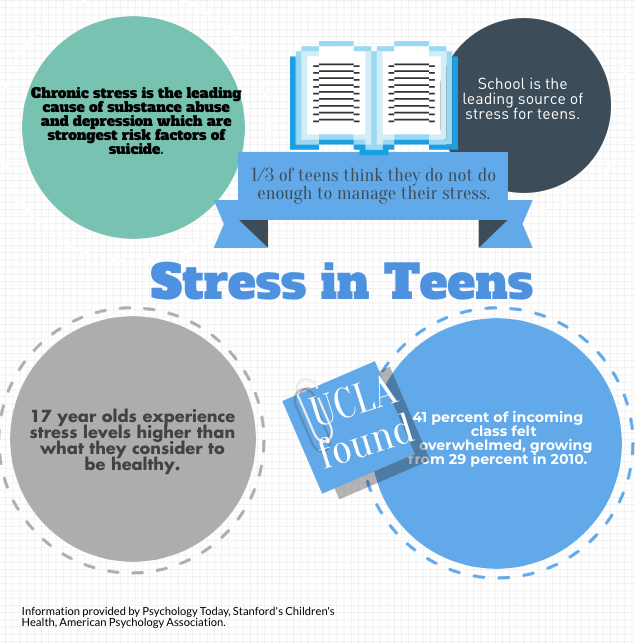Addressing the stressing
The infographic exhibits the current and severe dangers of stress for teenagers.
December 4, 2018
A labor-intensive homework assignment during the first week of school began to stress me out and to cloud my memory after the past three relaxing months of summer. Ironically, this homework, assigned in my college psychology class, addressed the exact feelings of stress I was experiencing.
The assignment involved researching and displaying the coping mechanisms in regards to stress. I quickly realized this assignment was not busy work at all, but a piece of knowledge that my former self suffered from not possessing.
Although many people understand that high school creates stress and teenagers are prone to suffer from its difficulties, education is sparse for teenagers in regards to combating that stress. Schools try to protect their students by raising awareness on the causes of teen fatalities, such as drugs and suicide. However, a simple solution to support the students is addressing the common producer of those causes: stress.
An American Psychological Association survey shows teens as having stress that mirrors the patterns of stress in adults, along with teens describing a higher stress level than adults in the past month.
Stress’ dangerous nature stems from its ability to evolve into detrimental feelings, mental illnesses, and harmful coping mechanisms, such as drugs.
As a result of stress, 30 percent of teens feel depressed and 31 percent of teens feel overwhelmed, according to the American Psychological Association. These feelings are the leading causes of suicide in teens, so the stress indirectly causes the fatalities.
“Stress is not just a mental experience, it affects your physiology,” CCHS psychology teacher Mr. Francis Caro said. “Therefore, it affects your lifestyle, creating problems with sleep, and creating dietary issues which obviously just makes everything more difficult without proper nutrition and sleep.
“This [nature of stress] will create a dangerous cycle where the struggles can quickly start to snowball and compound.”
The aforementioned mental illnesses that stress causes also include schizophrenia, bipolar disorder, and eating disorders.
A stress-ridden individual fosters a difficult decision of how to address the stress. This decision literally can be life or death, as the incorrect choice can lead to severe repercussions. The choice can be simplified in two general categories: active coping enacted by problem solving style methods, and avoidant coping, associated with self-punishing thoughts and beliefs, which can be self-defeating and result in a negative medical outcome, according to the National Eating Disorder Association.
Through the avoidant coping, the individual develops unhealthy habits and resorts to temporary relief producers. For teens uninformed about how dangerous their stress is, they unfortunately may exhibit avoidant coping.
“Especially for boys, in a society and school that emphasizes men solving their own problems and avoiding help seeking, you may see students resulting to things that are unhealthy to help cope,” Mr. Caro said. “This might make them more vulnerable to the alternatives like drinking, drugs, or tuning out the world and playing video games.
“These are all methods of escapism.”
Alex Carrieri ‘20 currently attends the college psychology course at CCHS, and he believes he benefited from the early year focus on stress.
“I really wish I took psychology as a freshman because I would have been so much better prepared to take on the academic, athletic, as well as social challenges of high school,” Carrieri said. “In a few months already, taking college psychology has changed the way I act, my daily routine, as well as my outlook on hardships and difficult situations. The psychology curriculum, especially the lessons on aspects of stress, helped me better understand myself and others, and has given me a better framework to live a healthy life, both physically and mentally.”
Carrieri’s reflection about the benefits of psychology’s informing on stress displays the reasoning for more awareness on stress for underclassmen. Students should receive vital information on stress before junior or senior year when they finally get an opportunity to take psychology. Psychology is not a necessary class to graduate either, meaning many students will graduate at a disadvantage because of the incognizance of stress’ evils.
School officials dedicate weeks to serious issues plaguing their institutions, including substance abuse and teen suicide. However, in those weeks they do not emphasize the extreme correlation of stress. By addressing the stress element and the healthy coping mechanisms, schools could prevent issues from starting.
“While I’m sure it’s not the same case for everyone, any teenager in society can recognize how many bad habits form as a result of compounding stress,” Carrieri said. “Students are constantly pushed to go beyond their own limits to complete tasks, earn good grades, as well as maintain a functioning social life with the hope of engaging in extracurriculars, as well.
“Many students seem to crumble under all that pressure, and find easy ways out. I see kids who seem to feel so helpless in their battle with stress they try to forget about it with drugs and alcohol.”
A few simple coping mechanisms that are general, but can be applied to most specific situations, include problem-focused strategies, appraisal-focused strategies, and exercise.
Problem-focused strategies involve simply addressing the foundation of the stressor and attempting to tackle it. Although some circumstances are not solvable, especially common domestic stressors, problem-focused strategies are usually the best approach to academic stress.
In simpler terms, students feeling the weight of tests, assignments, and confusion of concepts are best served by addressing the stressor through problem-focused strategies. Whether the method of attack is extra studying or focused efforts, problem-focused strategies eliminate the stressor at its source.
Appraisal-focused strategies deal with the individual’s perspective on the issue, essentially trying to find positives or to diminish the negatives cognitively. In some situations, discussing the stressors rather than bottling them up can assist an individual in his or her reappraisals.
When the only way to solve an individual’s stress is to literally move on, appraisal-focused strategies are an appropriate technique to cope.
The one coping mechanism that nearly always benefits an individual in his or her battle with stress is exercise. Studies show exercise reduces fatigue, improves alertness and concentration, and enhances overall cognitive function. This regime can be especially helpful when stress has depleted your energy or ability to concentrate, according to the Anxiety and Depression Association of America.
“The problem is we dedicate locked times to issues we face like red ribbon week, wellness day, yellow ribbon week, but something like stress is ever present,” Mr. Caro said. “Just because you learn a lot to do with stress, if your not stressed out then, it doesn’t strike you as relevant. We need to be more intentional about reminding students of how to deal with stress and not just say things like ‘everything will work out’ or ‘don’t sweat the small things.’ ”
Ultimately, the importance of stress awareness is less in the information of specific methods of coping, but more so in the expression of the normalcy of stress. Students should not feel isolated in their struggles. By informing students of the dangers of stress before stress is torturing the students firsthand, the students should be less likely to resort to harmful coping mechanisms.
“Schools need to help the students realize they have power,” Mr. Caro said. “For example, if your problem is class then take control, go straight to the teacher and try to control it. It may not completely remove the stress, but supporting the student in managing the stress is everything.”
The awareness could supply a necessary understanding that they are not helpless and harmful techniques of relief are not the only route to comfort. This understanding can aid an individual in his or her battles with the possible debilitating stress to come.
The labor-intensive assignment I kicked off my school year with complemented a unit of learning about an opponent I have battled with, but never understood. The feeling of preparedness the awareness and information of stress brought forth aided me in feeling well-equipped to combat the unavoidable stresses of life with healthy techniques.






















































